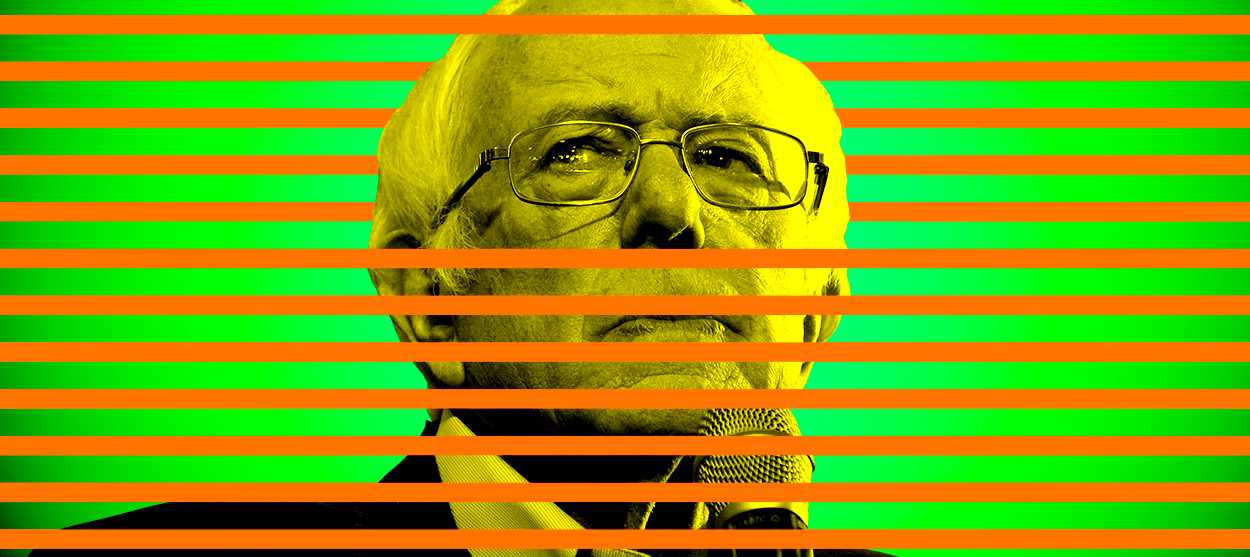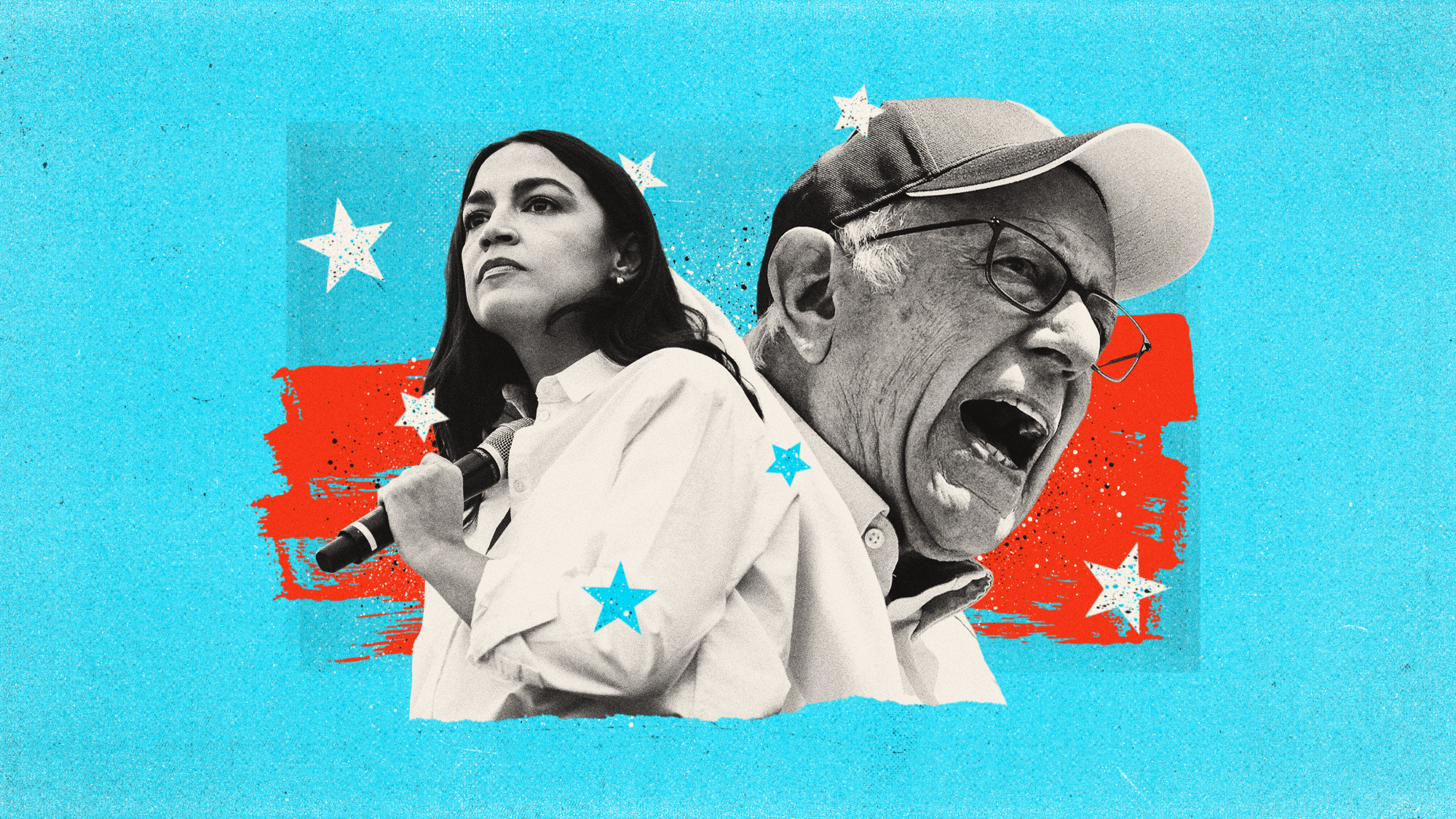The historical argument against Bernie Sanders
Why nominating the democratic socialist would be a huge risk for his party


A free daily email with the biggest news stories of the day – and the best features from TheWeek.com
You are now subscribed
Your newsletter sign-up was successful
Heading into tonight's debate and Saturday's Nevada caucuses, Bernie Sanders is the frontrunner in the topsy-turvy Democratic primary. That's the worst nightmare for many Democrats, who fear not only that he will lose to Donald Trump, but that Sanders will damage Democrats down-ballot, even potentially costing them the House. These fears are well founded in our recent political history, which suggests a Sanders nomination would play directly into the hands of Trump and the GOP.
The upheavals of the late 1960s, riots, student strikes, anti-war protests, new movements challenging traditional values, and the liberal Warren Court's rulings in favor of criminal defendants and against school prayer opened the door for conservatives to weaponize liberalism politically. Rhetoric about crime, the plight of the American family, the war in Vietnam and redistribution — especially as the booming postwar economy ground to a halt — convinced many white Americans to see liberals not as the creators of popular programs like Social Security and Medicare, but as culturally permissive and, even worse, caring little about their needs or values.
The political consequences first became visible in 1972 when President Richard Nixon — who styled himself the champion of an ignored "silent majority" crushed Democrat George McGovern. Thanks to his strong stance against the Vietnam War, McGovern enjoyed great popularity with newly enfranchised young voters and devoted significant outreach to them. But their affinity enabled Republicans to caricature the decorated veteran as the candidate of amnesty, acid, and abortion, a phrase ironically initially coined during the Democratic primary by Thomas Eagleton, McGovern's short-lived first running-mate. The very things that made McGovern appealing to younger voters also alienated working class whites and the burgeoning Sunbelt South, revealing irreparable fissures in the classic New Deal Democratic coalition, especially on racial and cultural issues. These divisions presented an opening for Republicans as their party moved rightward.
The Week
Escape your echo chamber. Get the facts behind the news, plus analysis from multiple perspectives.

Sign up for The Week's Free Newsletters
From our morning news briefing to a weekly Good News Newsletter, get the best of The Week delivered directly to your inbox.
From our morning news briefing to a weekly Good News Newsletter, get the best of The Week delivered directly to your inbox.
The Supreme Court's Roe v. Wade decision legalizing abortion in 1973, as well as the bipartisan push for the Equal Rights Amendment and Jimmy Carter's flailing attempts to tame stagflation only enhanced this opportunity further. As Carter called for sacrifice to address the energy crisis and bemoaned a lack of confidence among Americans instead of offering solutions, he enabled the rising conservative movement to drive the final stake in the electoral viability of New Deal liberalism. Though he was a moderate, Carter's ineffectiveness stripped liberalism of its allure. If Democrats had no answers, maybe it was time to try something very different.
Ronald Reagan defeated Carter in 1980 and his successful presidency redefined what was mainstream politically. Reagan took advantage of Carter's floundering, his own optimism and leadership skills, the end of stagflation, and the burgeoning conservative movement to convince Americans that instead of a force for bettering Americans' lives, government was a hindrance. The new conservative zeitgeist fueled an emerging pattern: whenever Republicans could caricature Democratic candidates as outside of the mainstream, they won big.
In 1984, Reagan trounced former Vice President Walter Mondale who Republicans painted as a tax and spender, thanks to a promise to raise taxes in his convention acceptance speech, and weak on defense. Four years later, it was Michael Dukakis who got branded outside of the mainstream. Ironically, Dukakis was one of a new breed of left-of-center politicians who worked to redefine the Democratic agenda, making it about efficient, leaner government that empowered the private sector — not government — to address American problems.. It hurt that he hailed from liberal Massachusetts (the only state that supported McGovern over Nixon). But Vice President George Bush's campaign and its allies also unfairly capitalized upon issues like prison furloughs, and Dukakis vetoing a bill mandating teachers lead the pledge of allegiance because it was unconstitutional to brand the Massachusetts governor as a dangerous cultural leftist.
While Bill Clinton successfully threaded the needle by, for example, flying home to Arkansas to preside over an execution during the 1992 New Hampshire primary and later declaring the era of big government over, he succeeded by mastering the rules of the conservative political environment constructed by Reagan, not by reshaping public attitudes about government or liberals. So it was that in 2004 Senator John Kerry lost a close election after President George W. Bush's campaign successfully painted him as out of touch — a windsurfing brahman who loved raising taxes and wouldn't keep Americans safe — in spite of the fact that it was Kerry, not Bush, who was a distinguished veteran.
A free daily email with the biggest news stories of the day – and the best features from TheWeek.com
Kerry's experience notwithstanding, the pattern of Republicans successfully caricaturing Democrats as outside of the mainstream has faded in the 2000s and 2010s — but not because this tactic became less potent. Rather, Democrats learned from their defeats, and followed Clinton's blueprint to craft an agenda that worked within the conservative framework while still addressing issues important to liberals.
Perhaps the best example: Barack Obama, campaigning in 2008 on expanding health care coverage, stressed, “if you've got a health care plan that you like, you can keep it.” This sort of rhetoric helped defuse Republican charges that he was an out of touch liberal proposing government-run health care.
Seeking middle ground hasn't guaranteed victory: Al Gore and Hillary Clinton both won the popular vote, but lost the electoral college, after Republicans convinced voters to question their honesty and ethics respectively.
But leading Democrats understand that it offered the best hope — until Sanders. His supporters claim that times have changed. They point to the popularity of some of his proposed programs, President Barack Obama's reelection after declaring his support for gay marriage, and polling showing that Sanders does better against Trump in head-to-head matchups than some of his opponents. But, it's worth remembering that before Bush's campaign unloaded on Dukakis, he led the vice president by 17 points. That's germane, because President Trump's lack of popularity means that to win he will need to make his opponent even less likable — Bush's predicament in 1988. Sanders' background as a self-proclaimed democratic socialist and history of controversial statements will be easy fodder.
There is also more recent evidence that being perceived as too far left is still problematic: in 2018, Democrats conducted an unintentional experiment in Arizona, one of 2020's few swing states. Senator Kyrsten Sinema ran as a moderate, and won by 2.4 percent, the first time that a Democrat won a Senate race in the state since 1988. By contrast, gubernatorial candidate David Garcia ran as an unabashed progressive, and lost by more than 14 points, albeit to an incumbent governor. Across the country, many of the candidates trumpeted by the left, including those who triumphed over more moderate opponents in Democratic primaries, lost their races, including several in winnable districts. Just last week, a new poll revealed that while 45 percent of Americans say they would vote for a socialist for president, 53 percent would not. And Republicans see Sanders as such a liability that they are already trying to tie down-ballot Democrats to him.
All of which is to say that Sanders would be an exceptionally risky nominee, potentially anathema to the suburban swing voters who delivered the House of Representatives to Democrats in 2018 and incapable of building a broad coalition, a prospect his rivals' supporters are increasingly raising.
That doesn't mean he is guaranteed to lose. Many Democratic strategists cheered the prospect of facing Reagan in 1980, seeing him as outside of the mainstream and easily caricatured in ways that other Republicans, like Bush, Senator Howard Baker, or former President Gerald Ford were not. Even Ford called Reagan "unelectable" in March, 1980. Democrats similarly felt that Trump's boorish behavior and lack of qualifications were disqualifying, likely to produce Republicans' worst loss since 1964.
But a polarizing incumbent president — like Jimmy Carter or Trump — prone to blunders can easily transform an opponent from being perceived as too extreme into the better of two less-than-ideal choices, worth taking a chance on. Sanders is a good debater, and it was in his one debate with Carter that Reagan convinced voters that he wasn't the extreme caricature he was purported to be.
For Democrats, it all comes down to playing the odds: Sanders represents an enormous risk. Is it worth taking when failure would equal four more years of Donald Trump? Probably not.
Want more essential commentary and analysis like this delivered straight to your inbox? Sign up for The Week's "Today's best articles" newsletter here.
Brian Rosenwald is a Resident Senior Fellow at the Robert A. Fox Leadership Program at the University of Pennsylvania, co-editor of Made by History at the Washington Post, and author of Talk Radio's America, forthcoming from Harvard University Press in 2019.
-
 6 of the world’s most accessible destinations
6 of the world’s most accessible destinationsThe Week Recommends Experience all of Berlin, Singapore and Sydney
-
 How the FCC’s ‘equal time’ rule works
How the FCC’s ‘equal time’ rule worksIn the Spotlight The law is at the heart of the Colbert-CBS conflict
-
 What is the endgame in the DHS shutdown?
What is the endgame in the DHS shutdown?Today’s Big Question Democrats want to rein in ICE’s immigration crackdown
-
 The billionaires’ wealth tax: a catastrophe for California?
The billionaires’ wealth tax: a catastrophe for California?Talking Point Peter Thiel and Larry Page preparing to change state residency
-
 Mamdani vows big changes as New York’s new mayor
Mamdani vows big changes as New York’s new mayorSpeed Read
-
 Bari Weiss’ ‘60 Minutes’ scandal is about more than one report
Bari Weiss’ ‘60 Minutes’ scandal is about more than one reportIN THE SPOTLIGHT By blocking an approved segment on a controversial prison holding US deportees in El Salvador, the editor-in-chief of CBS News has become the main story
-
 Has Zohran Mamdani shown the Democrats how to win again?
Has Zohran Mamdani shown the Democrats how to win again?Today’s Big Question New York City mayoral election touted as victory for left-wing populists but moderate centrist wins elsewhere present more complex path for Democratic Party
-
 Millions turn out for anti-Trump ‘No Kings’ rallies
Millions turn out for anti-Trump ‘No Kings’ ralliesSpeed Read An estimated 7 million people participated, 2 million more than at the first ‘No Kings’ protest in June
-
 Ghislaine Maxwell: angling for a Trump pardon
Ghislaine Maxwell: angling for a Trump pardonTalking Point Convicted sex trafficker's testimony could shed new light on president's links to Jeffrey Epstein
-
 The last words and final moments of 40 presidents
The last words and final moments of 40 presidentsThe Explainer Some are eloquent quotes worthy of the holders of the highest office in the nation, and others... aren't
-
 The anger fueling the Bernie Sanders and Alexandria Ocasio-Cortez barnstorming tour
The anger fueling the Bernie Sanders and Alexandria Ocasio-Cortez barnstorming tourTalking Points The duo is drawing big anti-Trump crowds in red states
